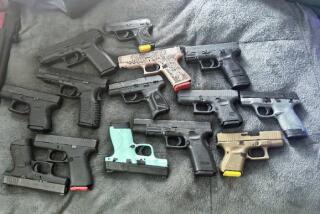Rare defeat in court ‘puts gun dealers across America on notice’
Strict federal protections couldn’t save the firearms industry from an unusual defeat in court this week.
In a nationally watched case, a Wisconsin jury ruled Tuesday that a Milwaukee-area gun store was negligent when it sold a handgun later used to shoot and seriously injure two Milwaukee police officers.
The gun had been bought illegally, and the officers sued the store. A Milwaukee County jury ordered the store to pay $6 million in damages, in effect sending a warning to other gun dealers.
“This is a huge precedent,” said Adam Winkler, author of “Gunfight: The Battle Over the Right to Bear Arms in America” and a law professor at UCLA. “This case puts gun dealers across America on notice: They have to exercise due care when selling guns.”
What happened?
Milwaukee Officers Bryan Norberg and Graham Kunisch were on patrol when they stopped Julius Burton for riding his bike on the sidewalk on June 9, 2009.
Burton shot both officers in the face with a Taurus .40-caliber pistol. Burton was convicted in the shooting and given an 80-year prison sentence.
But the case was far from over.
Burton, then 18, had been too young to buy a gun. A month before the shooting, he had paid a friend to buy the gun for him from Badger Guns, which was an illegal purchase. (The friend, Jacob Collins, later served two years in prison for the illegal gun sale.)
The officers, joined by the city of Milwaukee, sued the store, accusing Badger Guns of ignoring several warning signs that it was selling the pistol to a “straw” buyer.
Surveillance video from the store showed Burton picking out the gun, helping Collins fill out the paperwork, and going outside with Collins to get more money, according to local media coverage of the trial.
The store’s attorneys argued that the warning signs were not so clear-cut and that a store clerk did not intend to make an illegal gun sale.
Why does this case matter?
It’s hard to sue the gun industry.
This case is believed to be the first successful lawsuit against a gun store owner under a federal gun shield law.
In 2005, after years of urging by the National Rifle Assn., Congress passed the Protection of Lawful Commerce in Arms Act, which shields gun manufacturers and sellers from lawsuits stemming from the misuse of their guns.
The gun industry had been besieged by lawsuits from cities in the late 1990s seeking to hold the industry accountable for making and selling guns used by criminals.
The gun industry, alleging that those lawsuits cost it hundreds of millions of dollars in legal fees, said they threatened to put the industry out of business.
The law, however, does not protect stores that knowingly sell guns illegally.
NEWSLETTER: Get the day’s top headlines from Times Editor Davan Maharaj >>
What do the candidates say?
The law emerged during Tuesday night’s Democratic presidential debate. Hillary Rodham Clinton had voted against the law when she was a senator, and Sen. Bernie Sanders had voted for it.
“Do you want to shield gun companies from lawsuits?” the debate’s moderator, Anderson Cooper of CNN, asked Sanders.
“Of course not,” Sanders replied, calling it a “large and complicated” law.
“There were provisions in it that I think made sense,” Sanders said. “For example, do I think that a gun shop in the state of Vermont that sells legally a gun to somebody, and that somebody goes out and does something crazy, that that gun shop owner should be held responsible? I don’t.”
Clinton replied: “It wasn’t that complicated to me. It was pretty straightforward to me that he was going to give immunity to the only industry in America. Everybody else has to be accountable, but not the gun manufacturers. And we need to stand up and say: Enough of that. We’re not going to let it continue.”
What was so unusual about the Wisconsin case, and what’s next?
“This case succeeded in part because the evidence was overwhelming,” said Winkler, the UCLA law professor.
“The gun store had a long history of selling guns to criminals or selling guns that ended up being used for crime,” Winkler said. “There was a clear paper record; you could show the form with the name and addresses crossed off and replaced by others. You had video evidence of the sale.”
Badger Guns was particularly notorious among public safety officials.
In 1999, the Bureau of Alcohol, Tobacco and Firearms said the store — then called Badger Outdoors — led the nation in the number of guns it sold that were later traced to crimes.
In 2006, ATF investigators recommended that the store’s license be revoked. But the process was halted when the store shifted ownership to a former employee and took out a new license under the name Badger Guns.
“For some inconceivable reason, these individuals have been able to evade federal and local officials in plain sight by simply shuffling management titles and property ownership papers,” U.S. Rep. Gwen Moore (D-Wis.) complained in a 2006 letter to the ATF.
The ATF revoked Badger Guns’ license in 2011, according to the Milwaukee Journal Sentinel.
Badger Guns’ attorneys did not respond to requests for comment.
Winkler said that although Tuesday’s verdict was a “huge victory for the gun control movement” and could embolden other plaintiffs to sue “rogue gun dealers,” he cautioned that it could still be overturned on appeal, “so its long-term effects remain to be seen.”
ALSO
Democratic candidates court Culinary Union, the kingmaker of Nevada
Time to honor Martin Luther King at Confederate memorial in Georgia?
Black councilman tased by police in city where Sandra Bland was arrested
More to Read
Sign up for Essential California
The most important California stories and recommendations in your inbox every morning.
You may occasionally receive promotional content from the Los Angeles Times.











